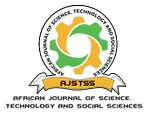Quality assurance programs to support tuberculosis diagnostic capacity amongst laboratories within Meru county, Kenya
DOI:
https://doi.org/10.58506/ajstss.v1i1.79Keywords:
Diagnostic Capacity, Quality assurance programs, TuberculosisAbstract
Background: According to the Kenya Ministry of Health, Meru County had reported a tuberculosis (TB) notification rate of 158/100,000 population in 2015. Aforementioned reports indicates that the prevalence of TB that warrants early detection and diagnosis, hence the need to determine quality assurance programs to Support tuberculosis diagnostic capacity of Tuberculosis amongst laboratories within Meru County. Objective: To determine quality assurance programs to support tuberculosis diagnostic capacity amongst laboratories within Meru County, Kenya. Materials and Methods: This was a descriptive study survey which utilized quantitative techniques to establish the potential and capacity of laboratory personnel in TB diagnostic laboratories in selected medical centres. Data entry was done through use of Statistical Package for Social Sciences (SPSS). Frequency and percentages were calculated. Findings were presented in form of frequency distribution tables and bar graphs and analyzed using Chi square. Results: Majority of laboratory personnel had indicated that their laboratories were public laboratories (69.2%) followed by private owned laboratories (30.8%). There were significant differences in the diagnostic capacity of TB between public and private owned laboratories in relation to availability of the following resources: Safety cabinet [χ2 (1 df, N= 26) = 18.49, p=0.000<0.05], Centrifuge [χ2 (1 df, N= 26) = 10.64, p=0.000<0.05], Gene Xpert resources [χ2 (1 df, N= 26) = 18.49, p=0.000<0.05], Freezer/refrigerator [χ2 (1 df, N= 26) = 14.28, p=0.000<0.05], Incubator [χ2 (1 df, N= 26) = 18.49, p=0.000<0.05] and TB florescence microscopy [χ2 (1 df, N= 26) = 18.49, p=0.000<0.05]. Majority of the respondents had been using Centre of Disease Control and Prevention (CDC) as their quality assurance schemes (61.5%) followed by Central TB reference laboratories, Ministry of Health (26.9%) and (others please specify) who never participated in any quality assurance scheme (11.5%). majority of respondents had been sending their specimens for TB culture and sensitivity to research institution (KEMRI Centre for Respiratory Diseases) (69.2%), followed by those who indicated ‘Any other’ thus not sending any specimen for TB culture and sensitivity (26.9%) and to private or commercial laboratories (3.8%). None of the respondents had indicated sending their specimens for TB culture and sensitivity to either Central TB Reference laboratories Q/A (ministry of health) or a university (0.0%).


